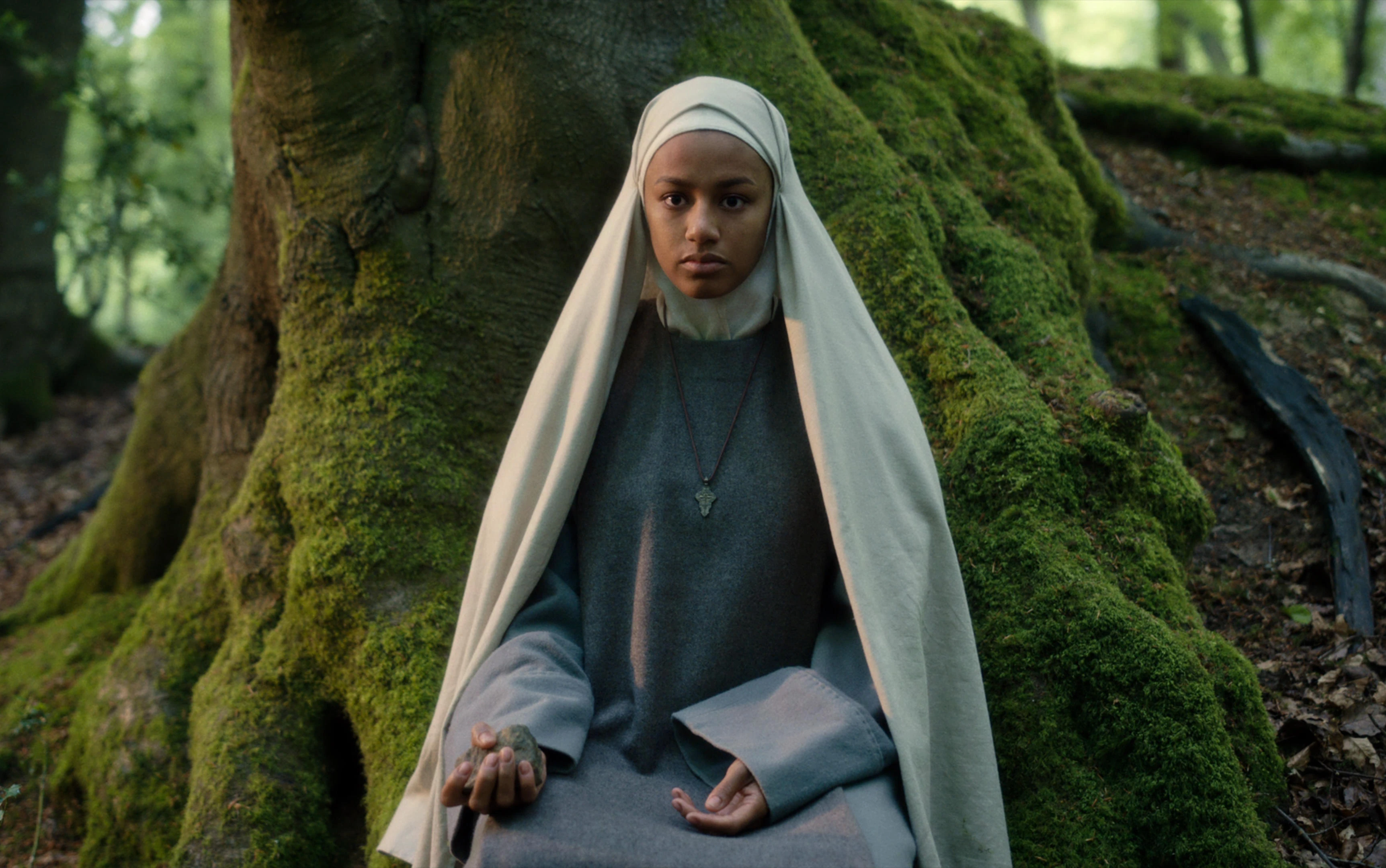Spoilers Ahead
The immense success of the Game of Thrones (GoT) universe has sent Netflix looking for the next GoT in unlikely places. Within the span of a year it has launched The Witcher and Cursed, two fantasy dramas that, like Game of Thrones, boast a sprawling multi-character story-line set in a fantastic medieval past. While The Witcher has its origins in video game, Cursed is inspired by the titular book by Thomas Wheeler and Frank Miller, a new female-centric take on the Arthurian legends.
Netfix’s choice to bet on these two dramas is a smart one. While The Witcher has a ready fanbase of gamers, Cursed caters to a demographic of young people who are hungry for fantastical entertainment without the usual dose of misogyny and sexism that accompanies it. Accordingly, the choice to pick a book that makes Nimue the protagonist is a logical one.
One of the most discussed angles in the Arthurian canon is the love triangle between Guinevere, Arthur and Lancelot. This angle has been fodder for many Arthurian romances over the decades. It is commendable that the first season of Cursed did not run with this angle and instead brought focus on Nimue, the Lady of the Lake, a relatively underrated angle in comparison to the Guinevere-Arthur-Lancelot angle. This is not to say that the Lady of the Lake has not drawn the attention of literary heavyweights. Walter Scott, Tennyson and others have all put their spins on the character. More recently, a pulp fiction writer like Meg Cabot too, has had a go
Katherine Langford’s Nimue does bring something fresh to the already vast cinema canon of Arthurian entertainment. The show also boasts Devon Terrell of Barry fame as King Arthur, the first black actor to play the role in recent history.
Also read: Netflix’s The Sinner Explains Why We Can’t Demonize Criminals & Wash Our Hands Off A Crime
Within the span of a year , Netflix has launched The Witcher and Cursed, two fantasy dramas that, like Game of Thrones, boast a sprawling multi-character story-line set in a fantastic medieval past. While The Witcher has its origins in video game, Cursed is inspired by the titular book by Thomas Wheeler and Frank Miller, a new female-centric take on the Arthurian legends.
Nimue, daughter to Lenore, is a Fey woman much like her mother and grows up amongst the Feyfolk at a time when they are incarcerated by a group of Christian faith militants called the Red Paladins. In her childhood, Nimue is attacked by a demon that leaves her with scars on her back as a result of which she is an outcast among her own people. The Red Paladins raid her village, killing her mother and almost raping Nimue. But since Nimue possesses magical powers, she is able to escape with a sword entrusted to her by her mother which she has to deliver to Merlin. This journey sets her on her quest that sees her become the Wolf Blood Witch and the Fey Queen. Arthur is reduced to her love interest. Although he is of man blood, he proves to be a valuable ally and later, a lover to Nimue.
The Fey are of various clans. There is the Snake clan who have faces with greenish scales, the Tusks who have tusks and who seem to enjoy creating unnecessary fights, and Nimue’s own people: the Skyfolk who seem to wear blue for some reason. Arthur and his sister Morgana are played by black actors. If you are confused by all this however, just remember that the protagonist is still the white woman.
Ever since ecofeminism became a mainstream concern, we have seen writers and filmmakers half-heartedly address the idea in mediocre entertainment (Frozen 2, anyone?). For the first few episodes, Cursed seems to go the tokenism route too, as Nimue loudly declares that there is nothing wrong in Morgana’s same-sex love with Celia. Nimue’s declaration is so out of the world in a medievalesque show where the wrath of masculinist Christianity drives the plot, that the discerning audience is almost afraid that the show is not serious in its representational politics and only wants a few brownie points. However, they do eventually present some well chalked-out female characters but Morgana’s lover Celia remains very much a temptress figure in Morgana’s character arc in season 1.

Another important character in the show is the Weeping Monk, a ruthless killer of the Fey who cannot be contained by the likes of the Green Knight (Sir Gawain silly!). Much of the season leaves us wondering why the show wastes an actor with the star potential of Daniel Sharman on this villainous character until the finale reveals his true identity, Lancelot. The Weeping Monk gets his redemption arc as he comes into contact with Squirrel (Percival) and the Green Knight in the camps of the Red Paladins.
The character that has caught my imagination is however, Iris, a girl who is so desperate to join the male faith militants that she burns down her abbey, kills multiple people and tries to kill Nimue in her desire for recognition from the Church. Above all, Iris desires male validation as she attempts to rise in a world rigged against her and she does not mind throwing other women under the bus to get what she wants. Iris is an antagonist with no redemption arc in this season at least, but one cannot help but sympathise with her as she harms herself when she fails to kill Nimue. In a departure from other female villains in fantasy dramas, Iris is all too vulnerable and all too human. She likely has a backstory and a reason for her behaviour.
The season finale leaves us on a very literal cliffhanger. The drunkard Merlin wields the Sword of Power to vanquish the Paladins after Nimue falls off the cliff. As a feminist watching the show, I wonder what was the point of putting Nimue through so much trouble if Merlin is to wield the sword in the end? How long will Merlin possess this magic and will it affect his bond with Nimue? Will Nimue’s fall and bodily harm remain a motivator to Merlin in typical Women in Refrigerators fashion? (Women in Refrigerators is a superhero-comic book trope that injures, harms, rapes or kills off the female protagonists – which is a concept called fridging and is employed to take forward the male character’s story.)
It does not suit Cursed – a show with so many interesting female characters to ultimately give in to the father figure as protector and avenger trope, even if that father figure is played by the inimitable Gustaf Skarsgard.
Also read: Why Are All The Lead Women Characters Crushed In Game Of Thrones Series End
It does not suit Cursed – a show with so many interesting female characters to ultimately give in to the father figure as protector and avenger trope, even if that father figure is played by the inimitable Gustaf Skarsgard. It also does not suit an otherwise progressive show to fall back onto the ableist trope of an evil blind character in the form of Brother Salt, the ruthless torturer responsible for the death of the Green Knight.
For season 2 of Cursed, hoping there is one, I would like to see how the dynamic between Lancelot and Nimue unfolds. The legends tell us that Nimue raised Lancelot after the death of his father and was a bit like a mother figure to him. Will the show somehow subvert this patriarchal modality or will it disavow it completely? Moreover, I want to know if the Sword of Power will be revealed to be Excalibur and if so, how would it aid Arthur in his quest? The season finale leaves us with more questions than answers.
Featured Image Source: cnet.com
About the author(s)
Ekabali Ghosh is an M. Phil. student in the Department of English, Jadavpur University. She is a feminist activist with about four years experience of organizing on the ground. She is the founder of Women Against Sexual Harassment, a platform that supports survivors of sexual violence and Queer Studies Research Cluster, an interdisciplinary network of researchers in the field of queer studies. She is passionate about issues of social justice, feminist theory and eating junk food. She can be found on Facebook and Instagram.




